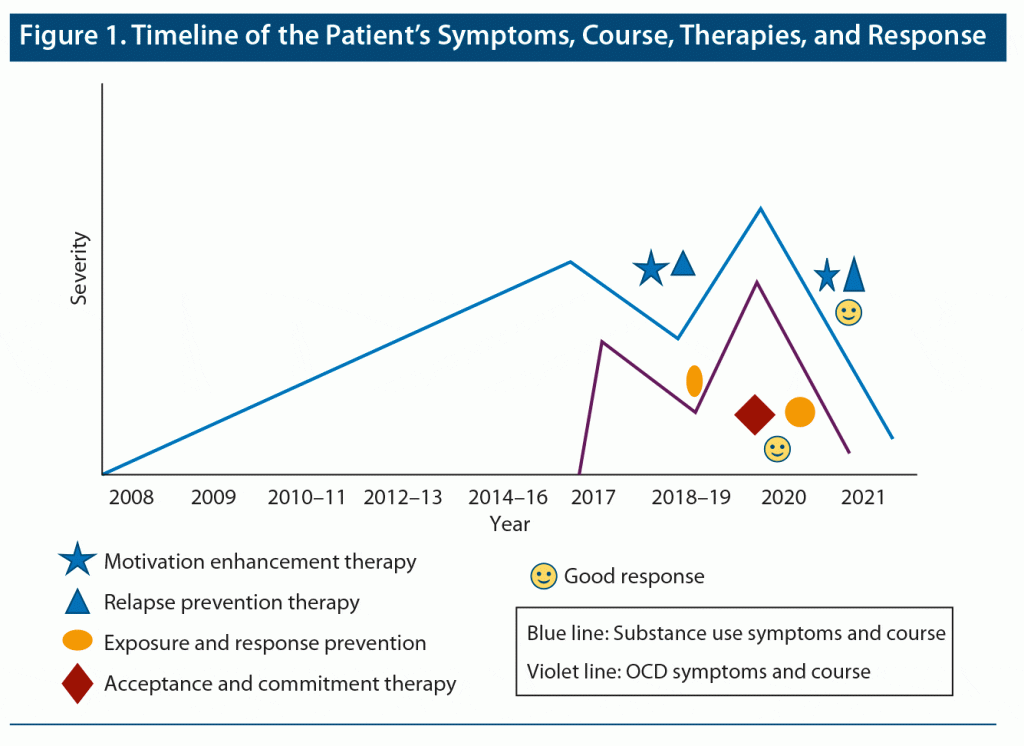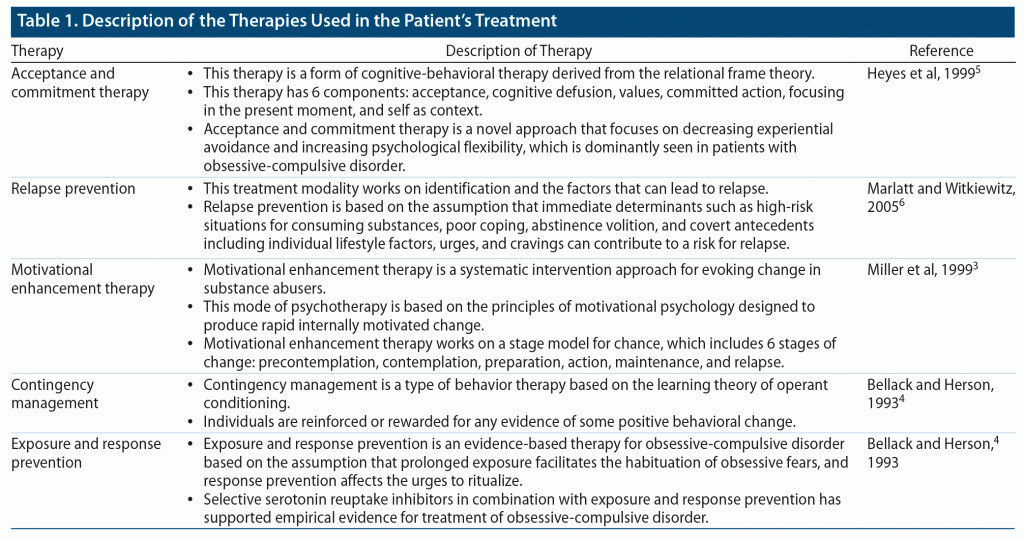
Prim Care Companion CNS Disord 2022;24(4):21cr03004
To cite: Singh GP, Bhatti M, Sharma P, et al. Acceptance and commitment therapy as an adjuvant to exposure and response prevention for dual diagnosis. Prim Care Companion CNS Disord. 2022;24(4):21cr03004.
To share: https://doi.org/10.4088/PCC.21cr03004
© Copyright 2022 Physicians Postgraduate Press, Inc.
aDepartment of Psychiatry, All India Institute of Medical Sciences, Bathinda, Punjab, India
bDepartment of Psychiatry, Govt Medical College and Hospital, Chandigarh, India
*Corresponding author: Gurvinder Pal Singh, MD, Department of Psychiatry, All India Institute of Medical Sciences, Bathinda, Punjab, India ([email protected]).
Dual diagnosis is a term used to describe a person who is diagnosed with a psychiatric disorder and a substance use disorder at the same time. The management of dual diagnosis of substance dependence with obsessive-compulsive disorder (OCD) is the most challenging clinical issue in the clinical psychiatric practice.1 The current approach for managing such patients is an integrated treatment approach in which the same team of mental health professionals provides treatment for both disorders at the same time, which would lead to a reduction of the obsessive-compulsive symptoms and symptom severity, as well as higher abstinence rates in patients with substance use disorder. Acceptance and commitment therapy intervention has found a place in the management of OCD.2 Here, we report the case of a patient with a diagnosis of substance dependence and OCD who improved with multimodal integrated interventions of pharmacotherapy, exposure and response prevention, and acceptance and commitment therapy.
Case Report
A 30-year-old man working as a priest in a rural religious temple was brought to our outpatient department in January 2019 with complaints of disturbed sleep and appetite; obsessional thoughts, impulses, and images; and increased use of multiple substances, predominantly alcohol dependence. After his obsessive-compulsive symptoms began 3 years ago, the patient increased his substance consumption, which he claimed would decrease his recurrent intrusive thoughts, images, and impulses. He reported that he would view private body parts of religious people/goddesses while performing religious rituals or private body parts of females and his children and would have recurrent impulses to touch them. Thus, he started avoiding going near his children, looking at and talking to females, and worshipping. He would have a recurrent impulse to kill anyone coming in front of his car, thus he started avoiding driving a car. These recurrent intrusive thoughts, images, and impulses were anxiety provoking and distressing to the patient, for which he would increase the amount of substance intake. He was admitted to the psychiatry ward and diagnosed with alcohol dependence syndrome with OCD and was prescribed lorazepam up to 10 mg, thiamine up to 200 mg, clomipramine up to 150 mg, and fluvoxamine up to 150 mg. Initial assessments included detailed general physical and mental status examination, blood tests, and various assessment scales.
There was a suspicion that the patient had impulsive personality traits and was high on novelty-seeking behavior, leading him to consume substances, which gradually increased to a dependence pattern. Subsequently, the patient developed obsessions at a clinically syndromal level. Being a priest, it was difficult for the patient to visualize naked body parts of goddesses, so he avoided his duties in the temple, and this distress led him to consume more substances. The behavior had become a vicious cycle. This behavioral deficit of avoidance of worshiping, going to the temple, and conducting religious rituals—like changing the clothes of goddesses, doing aarti (worship), and going to religious practice—led to dysfunction in his socio-occupational life.
The therapeutic process was aimed to target the patient’s substance dependence, obsessions, and avoidance behavior. Parallel sessions of motivation enhancement therapy and exposure and response prevention were initiated to target the patient’s readiness to change and control his craving for substances, and exposure and response prevention sessions were started to address the avoidance behavior.3,4 When improvement was observed, relapse prevention therapy and acceptance and commitment therapy were initiated with the rationale to work on the patient’s effective coping skills in high-risk situations and residual symptoms of obsessions.5,6
In the exposure and response prevention sessions, a hierarchy of the obsessions (least to most distressing) was made, and the patient reported 60% to 70% improvement in his obsessional thoughts, impulses, and images. However, after discharge from the psychiatry ward, he was not compliant with his medications and began consuming substances again. He was abstinent from multiple substances for 1 to 2 months following discharge before he started using alcohol and cannabis. He attempted suicide by sitting on the railway track after consuming cannabis, but he was rescued by neighbors, and he was again hospitalized in the psychiatry ward and received crisis management.
The patient was started on lorazepam at a maximum dose of 10 mg/d, thiamine up to 200 mg/d, and baclofen up to 40 mg/d. The dose of fluvoxamine was titrated to 150 mg/d. Before starting the therapy sessions, the patient’s motivation was assessed to be in the contemplation phase. Nonpharmacologic treatment with motivation enhancement therapy and relapse prevention therapy sessions was planned to target the substance dependence. The psychological sophistication of the patient was adequate. During the motivation enhancement therapy sessions, the patient’s motivation was at the action stage, and his scores on the Stages of Change Readiness and Treatment Eagerness Scale (SOCRATES)7 8A and 8D on recognition were 34 and 32 (medium), on ambivalence were 12 and 13 (low), and on taking steps were 32 and 31 (medium), respectively. The various multimodal interventions conducted included motivational interviewing, which included feedback, responsibility, advice, menu of options, empathy, and self-efficacy.3 Cost-benefit analysis, stimulus control measures, high-risk situations, escape/avoidance, coping strategies, urge surfing techniques, and practical tips such as the hunger, anger, loneliness, and tiredness model were addressed in the sessions. The delay, distraction, deep breathing, and drinking water technique was also utilized. The patient actively participated in these sessions, during which he addressed various states and situations likely to precipitate relapse, and the plan to quit the substance was also discussed. The patient’s coping ability was strengthened to handle the situations effectively.
Psychotherapy sessions for OCD included 12 sessions of exposure and response prevention therapy. The initial Yale-Brown Obsessive-Compulsive Scale8 (YBOCS) score was 22. In initial sessions, the patient was asked to construct a hierarchy of anxiety-provoking items and score each on a Subjective Unit of Distress Scale,9 ranging from 10 to 100. During the therapy sessions, daily exposure homework assignments were given. The patient had previously kept an anxiety log, in which he rated his subjective anxiety before, during, and after contact with the anxiety-evoking stimuli. As part of therapy during the hospitalization, he was asked to keep a record of his anxiety-provoking obsessions. The sessions included brief discussions of the successes and difficulties faced while doing the homework. An imaginal exposure was created, and the patient was presented with anxiety-provoking scenes, which were constructed based on the interview that was carried out initially. The patient reported 50% to 60% improvement in his symptoms after 12 sessions of exposure and response prevention.
The acceptance and commitment therapy sessions were started as an adjuvant to exposure and response prevention to reduce the severity of the residual symptoms. This therapy taught the patient the psychological skills needed to handle painful thoughts and feelings effectively and helped to clarify what was truly important and meaningful to him. Eight sessions of acceptance and commitment therapy were adopted from an abbreviated treatment manual. Initially, mindful breathing sessions were conducted, and the patient was guided to set valued goals. In these sessions, identification of problematic thoughts and feelings, experiential avoidance, and unworkable actions were addressed. During the initial 3 sessions, distressing thoughts, feelings, and memories that he was trying to avoid or get rid of through experiential avoidance (pathological avoidance) were explored. Chinese finger trap metaphor was used in another session to enhance his learning skills to control the problem. The patient was advised to clarify values and use those values to guide behavioral change. During 8 sessions, the patient was receptive and acknowledged that his thoughts and feelings were not the main problems. In these sessions, he realized that getting caught up in the thoughts and feelings (fusion) and struggling with them (avoidance) created his problems and that his thoughts and feelings could not be controlled. A lemon, lemon, lemon exercise was demonstrated to him in 1 session. There were significant reductions in the assessment severity scales for substance dependence and OCD. Figure 1 provides a timeline of the patient’s disease and treatment course. The therapies used to treat the patient are described in Table 1.
The posttreatment YBOCS score was 8. The SOCRATES 8A recognition score was 34 (high), ambivalence was 12 (low), and taking steps was 36 (high). The SOCRATES 8D recognition score was 33 (medium), ambivalence was 13 (low), and taking steps was 35 (high).7,8 The patient reported an overall 70% to 80% improvement in his obsessions and avoidance behavior and 70% improvement in his cravings for the substance. After discharge, the patient was lost to follow-up. A home visit by the treating team member to his address in the file records was conducted, and family members said the patient had been sent to a long-term rehabilitation center in his hometown by the religious temple management.
Discussion
This report discusses a multidisciplinary approach in the management of a patient with a dual diagnosis. In this index patient, in addition to treating OCD with medications and exposure and response prevention, acceptance and commitment therapy was introduced. This integrated therapy was beneficial, and 70% improvement was seen. In addition, acceptance and commitment therapy proved beneficial for both the residual symptoms of OCD and the substance cravings. Acceptability and tolerability were not compromised during this therapy. In addition to treating OCD, treating his substance use disorder separately with medications and through various evidence-based psychological interventions such as motivation enhancement therapy and relapse prevention therapy produced even better outcomes. There was a significant reduction in the severity scores of the assessment scales after all the pharmacologic and psychological interventions were completed. Thus, a multidisciplinary approach toward the treatment of this dually diagnosed patient proved beneficial and resulted in significantly good outcomes.
In routine clinical practice, patients with dual diagnosis were initially sent to deaddiction centers and then later to psychiatric centers for psychological interventions. This practice leads to the reduction of the proportion of comorbid cases in the clinical OCD setting. Also, the studies10 examining OCD clinic patients were biased in the view that they manage only the regular attenders. The bias against these “typical comorbid” cases also arises due to the unreliable or irregular clinic attendance, which was the hallmark of patients with substance use disorders. Therefore, it was proposed that OCD phenomenology could be the reliable predictor of risk for substance use disorder.7 According to the serotonin hypothesis, cannabis improves OCD symptoms by modulating the serotonergic system.6 Based on this hypothesis, patients with OCD would increase cannabis consumption, as it decreases thoughts and relieves anxiety. It was documented in a study11 that cannabis and alcohol dependence have a strong correlation with OCD compared to other anxiety disorders. Also, higher alcohol dependence, tobacco use, and drug dependence were found in the OCD group compared to the group with other neurotic disorders.11 Evidence-based behavioral modalities such as contingency management, motivation enhancement therapy, and 12-step facilitation have received empirical support in the management of substance dependence.3,12 Also, given that the OCD symptoms are ego dystonic, it is likely that individuals with this disorder often do not report their symptoms and prefer to self-medicate with alcohol or other substances.13
There is limited literature focusing on the underlying mechanism of the relationship between dual diagnosis and various risk factors and management issues. The pharmacologic and nonpharmacologic management specifically focused on treating OCD and substance dependence, which involved exposure and response prevention and acceptance and commitment therapy, was beneficial to the patients. Therefore, understanding and treating both the disorders simultaneously could result in better outcomes.14–16
Conclusion
Acceptance and commitment therapy as adjuvant to exposure and response prevention was significantly beneficial in treating the residual symptoms and reducing craving for the psychoactive substance in our patient. The multidisciplinary integrated approach, which involves both pharmacotherapy and psychotherapies (exposure and response prevention, motivation enhancement therapy, acceptance and commitment therapy) in treating both disorders simultaneously, resulted in better outcomes.
Published online: July 7, 2022.
Relevant financial relationships: None.
Funding/support: None.
Patient consent: The patient provided consent to publish this case report, and information has been de-identified to protect anonymity.
References (16)

- Lack CW. Obsessive-compulsive disorder: evidence-based treatments and future directions for research. World J Psychiatry. 2012;2(6):86–90. PubMed CrossRef
- Twohig MP, Vilardaga JC, Levin ME, et al. Changes in the psychological flexibility during acceptance and commitment therapy for obsessive compulsive disorder. J Contextual Behav Sci. 2015;4(3):196–202. CrossRef
- Miller WR, Zweben A, DiClemente CC, et al. Motivational Enhancement Therapy Manual: A Clinical Research Guide for Therapists Treating Individuals With Alcohol Abuse and Dependence. US Department of Health and Human Services Public Health Service. NIH. National Institute on Alcohol Abuse and Alcoholism. Rockville, MD: Publications No 94–3723; 1999.
- Bellack AS, Herson M, eds. Handbook of Behavior Therapy in the Psychiatric Setting. Plenum Press; 1993.
- Heyes SC, Strosahl KD, Wilson KG. Acceptance and Commitment Therapy: An Experiential Approach to Behavior Change. Guilford Press; 1999.
- Marlatt GA, Witkiewitz K. Relapse Prevention for Alcohol and Drug Problems. 2nd ed. In: Marlatt GA, Donovan DM, eds. Relapse Prevention: Maintenance Strategies in the Treatment of Addictive Behaviors. 2005:1–44.
- Miller WR, Tonigam JS. Assessing drinkers’ motivation for change: the Stages of Change Readiness and Treatment Eagerness Scale (SOCRATES). Psychol Addict Behav. 1996;10(2):81–89. CrossRef
- Goodman WK, Price LH, Rasmussen SA, et al. The Yale-Brown Obsessive-Compulsive Scale, I: development, use, and reliability Arch Gen Psychiatry. 1989;46(11):1006–1011. PubMed CrossRef
- Wolpe J. The Practice of Behavior Therapy. New York: Pergamon Press; 1969.
- Hezel DM, Simpson HB. Exposure and response prevention for obsessive-compulsive disorder: a review and new directions. Indian J Psychiatry. 2019;61(suppl 1):S85–S92. PubMed CrossRef
- Cuzen NL, Stein DJ, Lochner C, et al. Comorbidity of obsessive-compulsive disorder and substance use disorder: a new heuristic. Hum Psychopharmacol. 2014;29(1):89–93. PubMed CrossRef
- Ray LA, Meredith LR, Kiluk BD, et al. Combined pharmacotherapy and cognitive behavior therapy for adults with alcohol or substance use disorder: a systematic review and meta-analysis. JAMA Netw Open. 2020;3(6):e208279. PubMed CrossRef
- Szejko N, Fremer C, Müller-Vahl KR. Cannabis improves obsessive-compulsive disorder: case report and review of literature. Front Psychiatry. 2020;11:681–690. PubMed CrossRef
- Blom RM, Koeter M, van den Brink W, et al. Co-occurrence of obsessive-compulsive disorder and substance use disorder in the general population. Addiction. 2011;106(12):2178–2185. PubMed CrossRef
- Fals-Stewart W, Schafer J. The treatment of substance abusers diagnosed with obsessive-compulsive disorder: an outcome study. J Subst Abuse Treat. 1992;9(4):365–370. PubMed CrossRef
- Mancebo MC, Grant JE, Pinto A, et al. Substance use disorders in an obsessive-compulsive disorder clinical sample. J Anxiety Disord. 2009;23(4):429–435. PubMed CrossRef
Enjoy this premium PDF as part of your membership benefits!







